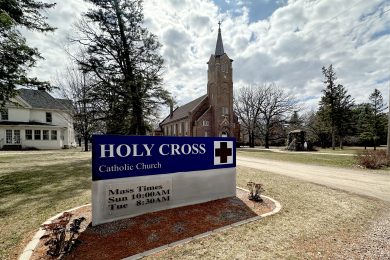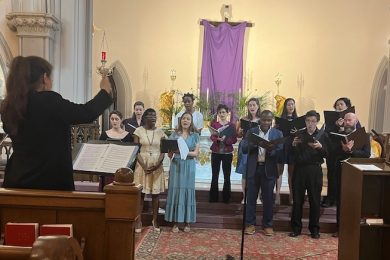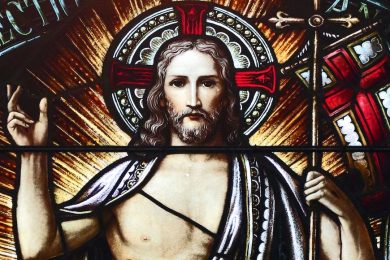Q: As I was selecting music for my parish’s celebration of Corpus Christi on June 3, I noticed that the Scripture readings for this year’s Mass focus on blood. What is the significance of this?
A: It was her favorite sweater, the one that her brother had brought her as a souvenir from Iceland. Such lovely wool, so expertly woven. And then, drops of blood from a sudden nosebleed fell upon that sweater and it was never the same again. Even in spite of spotting and dry cleaning, that sweater forever wore the stain of blood.
The Israelites knew how powerful blood could be. When they saw blood spill out of a person or an animal, resulting in death, they easily equated blood with life. When the blood was lost, so was a life. And life, they knew, and the blood that symbolized it, were gifts from the living God.

The drops of blood that fall to the floor in the emergency room, the stream of blood from a deep wound: nothing so graphically reminds us of our mortality. For as the ancient Israelites knew, when our blood is gone, so is our life. And so, blood is the premier biblical symbol of life.
The Israelites came to know the living God during their long desert journey on the way to the promised land. There they stood, at the foot of Mount Sinai, maybe a bit awe-struck, as they received the words and ordinances of the Lord from their leader, Moses, and promised to faithfully follow God’s law.
There they stood as Moses took bowls of blood from the sacrificed animals, splashed some of it on the altar (which stands for God) and sprinkled the rest on the people, saying “This is the blood of the covenant that the Lord has made with you in accordance with all these words of his” (Exodus 24:8).
The blood fell from the sky like a scarlet rain, soaking into their clothes and souls. And having no stain remover or washing machines or dry cleaners, they could count on having a permanent, indelible reminder of the covenant with God sealed that day in blood. Half the blood given to God in sacrifice, half the blood sprinkled upon the people: thus, God and God’s people shared the blood, shared the life of the covenant forever.
Long after those blood-stained clothes and their wearers were gone, the covenant made that day endured. But only God was completely faithful to it. Blood, the life of the animals sacrificed to God in the Temple, continued to link God and God’s people in the covenant throughout the centuries until Jesus came to be the one perfect sacrifice for sin.
As at the foot of Mount Sinai, so on the top of Mount Calvary, the offering of blood brought a sharing of life between God and God’s people. But the blood of Jesus Christ brings us life more powerfully and completely than any other sacrifice ever could. For the blood of Jesus Christ is the very life of God, poured out for us sinners as our life-giving drink.
The blood of Jesus Christ marvelously cleanses us from sin and protects us from evil as it is poured out for us in the Eucharist. This is the truth that is captured in a wonderful image in the Book of Revelation. John the seer gazes upon God’s holy ones from every time and place, and wonders who all these people are, all dressed in the whitest white. The answer comes: “These are the ones … who have washed their robes and made them white in the blood of the Lamb” (Revelation 7:14).
The Blood of Christ is the God-given bleach for all believers. It alone could wash away our sins and offenses and seal the life-giving, eternal covenant between God and humankind. The blood of Christ is the divine gift that unites God and humankind in a bond of life and love. Such is the unity that the apostles shared with Jesus at the Last Supper as they shared the cup of his blood. “They all drank from it,” St. Mark tells us (Mark 14:23). By this act they were committing themselves to self-sacrificing love unto death, just as Jesus did that night.
Today, our receiving the body and blood of Christ commits us to living as the people of the new covenant in his blood, those who are received into his self-offering on the cross for the life of the world. Eating the body of Christ and drinking the blood of Christ makes us and marks us as his followers, permanently and eternally.
Several decades ago, the U.S. Postal Service issued a stamp with an image of a drop of blood and the reminder: “Giving Blood Saves Lives.” Yes, it does. But these words, “Giving Blood Saves Lives,” are preeminently true of Jesus Christ. His giving his blood on the cross, and his giving it to us in the Eucharist, saves us from eternal death and saves us for eternal life with God.
Benedictine Father Michael Kwatera, a monk of St. John’s Abbey in Collegeville, serves as the abbey’s director of liturgy. Please send your questions on liturgy to him at mkwatera@csbsju.edu or at St. John’s Abbey, P.O. Box 2015, Collegeville, MN 56321-2015.





















